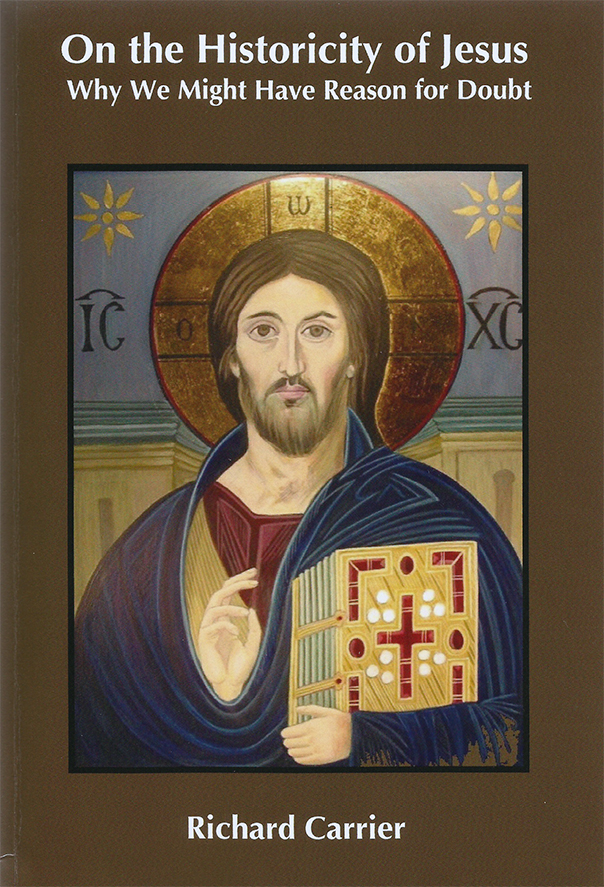Editor’s note: Today I changed the subtitle of this site from ‘Two lies are murdering the white race’ to ‘The Jewish Question and Christianity are one and the same’. In the excerpts reproduced below from chapter 5 of Richard Carrier’s magnum opus, he wrote:
Thus it should not surprise us that Christianity converted all the military imagery of popular messianism into spiritual metaphor, to represent what we would now call a culture war.
Emphasis appears in the original. In the next page he added:
That the Christians and the Zealots both may have come from the same sectarian background, and pursued collectively the only two possible solutions to the problem facing the Jews at the time, reveals Christianity to be more akin to something inevitable than something surprising.
Definitively, Carrier’s On The Historicity of Jesus: Why We Might Have Reasons for Doubt contains key passages that substantiate the content of the masthead of this site, the Rome vs. Judea essay, linked in the sticky post above.
These are the first paragraphs of the chapter “Background Knowledge (Context)”:
______ 卐 ______
 The previous chapter surveyed the background knowledge directly relating to the Christian religion (origins, beliefs and development) that we must take into account when evaluating any hypothesis regarding the historical existence of Jesus. This chapter will survey the most important background knowledge regarding the context in which Christianity began (political, religious and literary), as well as its most pertinent scientific and historical analogs.
The previous chapter surveyed the background knowledge directly relating to the Christian religion (origins, beliefs and development) that we must take into account when evaluating any hypothesis regarding the historical existence of Jesus. This chapter will survey the most important background knowledge regarding the context in which Christianity began (political, religious and literary), as well as its most pertinent scientific and historical analogs.
Elements of Political Context
The origin of Christianity makes sense only within the peculiar political context that produced it, and in light of analogous movements throughout history.
Element 23: The Romans annexed Judea to the imperial province of Syria in 6 CE, bringing the center of the Holy Land under direct control of the Roman government, ending Jewish sovereignty over Jerusalem and the temple of the Most High God, along with most of the Holy Land that had been promised by God to the Jews.
In fact, God had promised that the Jews would not only rule their own land, city and temple, but subjugate all peoples and rule the whole world as the chosen people of God (Zech. 14.9-18; Psalm 2), which was also a common feature of messianic belief (Elements 3 and 4), one timetable for which predicted this outcome was imminent (Element 7). The Roman annexation contradicted all of this, which would have inevitably produced cognitive dissonance between what Jews expected (the fulfillment of God’s promise) and what happened (the Jews lost their sovereignty and became a subject people). The result was a permanent state of violent tension between the Roman occupation and Jewish rebellion that concluded in three devastating wars (against Nero in 66-70 CE, against Trajan in 115-117 and against Hadrian in 132-136) and countless smaller rebellions (beginning with Judas the Galilean in 6 CE), all of which the Jews consistently lost.
Element 24: (a) Owing to their vastly greater resources (in materials, money and manpower) and superior technical ability (in the training, equipping and supplying of their armies) the Romans were effectively invincible and could never be expelled from Judea by force or diplomacy. (b) This fact was so empirically evident and publicly tested and demonstrated on such a wide scale that it had to have been evident to at least some Jews, even while many either didn’t see it, denied it even when seen, or imagined celestial aid would redress the imbalance.
In other words, the traditional messianic hope (of a conclusive military victory over all of Israel’s neighbors) was a doomed hope, and that would have been obvious to at least some Jews. History would of course decisively prove this, as messianic movements were either wiped out quickly (Element 4) or led to the utter defeat and destruction of Jerusalem and the entire Jewish polity (already in the Neronian War of the 60s; even more so in the subsequent wars under Trajan and Hadrian: Element 23). This had happened before, most infamously to both Carthage and Corinth in the same year (146 BCE), which any educated observer would know about. In fact, up to the time Christianity began, Roman victory was always the outcome, without exception, for every nation that ever stood against any concerted Roman conquest and occupation.
For example, even the infamous defeat of Varus by the Germans in 9 CE was decisively redressed by Germanicus only a few years later, illustrating the futility even of a victory against the Romans. This was a phenomenon so consistently repeated that it had already become a popular joke by the time of Christ, which is called even still a ‘Pyrrhic victory ‘, from the legend, widely circulated in antiquity, that in the third century BCE the Greek upstart Pyrrhus had won his victories against the Romans at such cost that he declared ‘one more victory and I’m done for’ (or words to that effect), which prophecy was fulfilled in short order. After centuries of history repeating itself like this without fail, only a fool would bank on a future rebellion against the Romans having any other outcome. And though fools were always to be found, not all men are fools.
It would therefore be extremely improbable if no early-first-century Jews could foresee this (even if most, evidently, did not). Predicting this outcome would have been all the easier for anyone aware of recent analogous events, from the fates of Carthage and Corinth to the early Jewish rebellions described by Josephus, which were so quickly and easily suppressed that the reality must have become apparent to some. It would have been a simple matter to put two and two together: Roman military might plus Jewish military messianism equals the inevitable destruction of the Jews.
Element 25: The corruption and moral decay of the Jewish civil and temple elite (regardless of to what extent it was actual or merely perceived) was a widespread target of condemnation and often a cause of factionalizing among Jewish sects. This is evident throughout the narrative of Josephus regarding the causes and outcomes of the Jewish War, as well as in the literature recovered at Qumran (e.g. 4Q500), and in much of the apocryphal, apocalyptic and pseudepigraphical literature produced or popularized by first-century Jews. It is also a persistent theme in the Christian Gospels, which in that context do not seem aberrant in this respect but in fact typical.
Element 26: For many Jews in the early first century (in accord with the previous element) the Jewish elite became the scapegoats for God’s failed promises (in accord with Elements 23 and 24): the reason God withheld their fulfillment (and instead allowed the Romans to rule) was imagined to be the Jewish elite’s failure to keep God’s commandments and govern justly. God would come through only when all sin had ended and been atoned for (Dan. 9.5-24). The Dead Sea Scrolls, for example, repeatedly denounce the Jewish civil and temple elite as responsible for the evil that has befallen the land, in terms similar to those found in the Christian Gospels. […]
Element 27: (a) The temple at Jerusalem was the central focus of most Jewish messianic hopes (as, for the Samaritans, was Mount Gerizim), which entailed that as long as the ‘corrupt’ Jewish elite control led it, God would continue Israel’s ‘punishment’ (in accord with Elements 25 and 26); and as long as the Romans remained in power, they would maintain the corrupt Jewish elite’s control of the temple. Accordingly, (b) Jewish religious violence often aimed at seizing physical control of the temple and its personnel.
Element 28. […] But if any Jews had realized that such a reconquest was impossible (as some must, in accord with Element 24) but still sought a means to escape their cognitive dissonance (in accord with Element 23) without denying the evident facts or abandoning deep-seated religious beliefs, then for them only one solution remained: to deny the physical importance of the temple at Jerusalem itself. […]
Therefore, if any religious innovator had proposed that God had arranged a supreme sacrifice capable of cleansing all sins once and for all (such as, e.g., through the ritual atoning sacrifice of his firstborn son: Element 10), and further arranged that God’s spirit would, as a result, dwell forever within each individual who pledged himself to him (and thus no longer dwell, or dwell only, with in the temple at Jerusalem: Element 18), then his message would resonate among many Jews as an ingenious and attractive solution to the problem of Jewish elite corruption and Roman invincibility (Elements 23-26), by eliminating the relevance of the temple to messianic hopes, and thus eliminating the basis for any doomed military conflict with Rome […].
The basic Christian gospel—imagining that the death of a messiah had conclusively atoned for all sins, and that by joining with him God would dwell in us (instead of the temple)—would thus be recognized by many Jews as an ingenious and attractive idea. […]
The only sacred space this doctrine required one to physically control was one’s own body, a notion already popularized by philosophical sects such as the Stoics, who taught that nothing external can conquer a man who in his wisdom remains internally free. Not death, nor imprisonment, nor torture represented any victory over him. This was therefore a battle one could always win, even against the ‘invincible’ Romans. One merely had to believe it, to feel it was true, that God now lived in you. No other evidence was required. Thus it should not surprise us that Christianity converted all the military imagery of popular messianism into spiritual metaphor, to represent what we would now call a culture war. […]
The relevance of this observation is that the earliest Christian gospel makes far more sense as a product of its political context than it does when completely divorced from that context, and in consequence, theories of historicity [of Jesus] that ignore that fact are unlikely to have any objective merit. The centrality of the temple was a continual problem for the Jews. A physical location requiring political control entailed military domination. So long as the Romans had the latter, the Jews would never have the former. The Zealots took the logical option of attempting to remove the Romans and restore Jewish control. But the Christians took the only other available option: removing the temple from their entire soteriological (or ‘salvation’) scheme.
Christians could then just await God’s wrath to come from heaven (in accord with Element 10), while in the meantime, God’s promise could be delivered unto the kingdom they had spiritually created (Rom. 14.17-18; I Cor. 4.19-20), first in an anticipatory way (in the moral and ‘supernatural’ success of the Christian community), and then in the most final way (in the apocalypse itself: e.g. I Cor. 15.24, 50; 6.9-10; Gal. 5.19-25; 1 Thess. 4.10- 5.15). That the Christians and the Zealots both may have come from the same sectarian background, and pursued collectively the only two possible solutions to the problem facing the Jews at the time, reveals Christianity to be more akin to something inevitable than something surprising.





